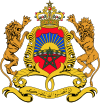 |
|---|
| Judiciary |
|
|
| History of Morocco |
|---|
 |
The Mudawana (or Moudawana, Arabic: المدوّنة, lit. 'code'), short for mudawwanat al-aḥwāl ash-shakhṣiyyah (مدونة الأحوال الشخصية, lit. 'personal status code'),[1] is the personal status code, also known as the family code, in Moroccan law. It concerns issues related to the family, including the regulation of marriage, polygamy, divorce, inheritance, and child custody. Originally based on the Maliki school of Sunni Islamic jurisprudence, it was codified after the country gained independence from France in 1956. Its most recent revision, passed by the Moroccan parliament in 2004, was praised by human rights activists for its measures to address women's rights and gender equality within an Islamic legal framework.[2]
Although there were calls for reform to the family law in the 1960s and 1970s, its religious origins made amending it a challenge, and no serious movement for reform emerged until the 1980s. As a result of newly created civil society organizations, including many women's organizations, and increased international attention on women's rights, modest reforms to the Mudawana were enacted in 1993 under King Hassan II. Following this initial change, increased activism resulted in the articulation of a Plan of Action for the Integration of Women in Development, which drew heavily from secular, rights-based frameworks. This sparked fierce debate and opposition within Moroccan political elites and, to a somewhat lesser extent, Moroccan society and culminated in two rallies in Casablanca and Rabat in March 2000 – one in support of reform and one in opposition to it. This occurred shortly after Mohammad VI succeeded his father as King, and within a year of the rallies, he announced the formation of a commission to further reform the Mudawana. In 2003, he announced his intention to replace the code entirely, citing his authority as both spiritual and political leader of the nation, and by January 2004, the Moroccan parliament had ratified the new version.
Major components of the reforms included raising the minimum legal age of marriage to 18 for men and women, establishing joint responsibility for the family among men and women, limiting the terms of polygamy and divorce, and granting women more rights in the negotiation of marriage contracts, among other provisions. Supporters of the reforms point to broad support for them among Moroccan society, especially among women, and cite the new law as a successful example of a progressive reform framed in indigenous, Islamic principles. Critics of the reforms point to the elitist roots of the movements that advocated for the reforms, the influence of Western secular principles, and the many barriers to the law's implementation within Moroccan society.
- ^ Dieste, Josep Lluís Mateo (2009). ""Demonstrating Islam": the Conflict of Text and the Mudawwana Reform in Morocco". The Muslim World. 99: 134–154. doi:10.1111/j.1478-1913.2009.01258.x.
- ^ Tamanna, Nowrin (December 2008). "Personal status laws in Morocco and Tunisia: a comparative exploration of the possibilities for equality-enhancing reform in Bangladesh". Feminist Legal Studies. 16 (3): 323–343. doi:10.1007/s10691-008-9099-9. S2CID 144717130.